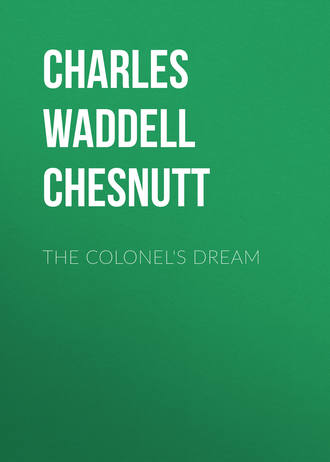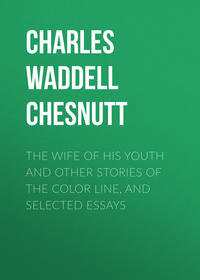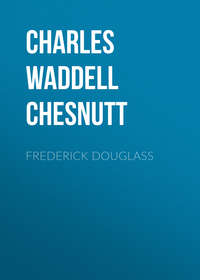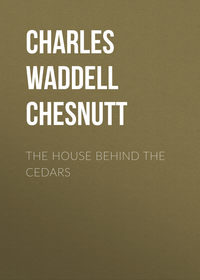 полная версия
полная версияThe Colonel's Dream
"Try again, Viney," he said, "that's a good girl. Your old master thinks a great deal of you, Viney. He is your best friend!"
Again she made an inarticulate response, which he nevertheless seemed to comprehend, for, brightening up immediately, he turned from her, came down the steps with tremulous haste, muttering to himself meanwhile, seized a spade that stood leaning against the steps, passed by the carriage without a glance, and began digging furiously at one side of the yard. The old woman watched him for a while, with a self-absorption that was entirely oblivious of the visitors, and then entered the house.
The colonel had been completely absorbed in this curious drama. There was an air of weirdness and unreality about it all. Old Peter was as silent as if he had been turned into stone. Something in the atmosphere conduced to somnolence, for even the horses stood still, with no signs of restlessness. The colonel was the first to break the spell.
"What's the matter with them, Peter? Do you know?"
"Dey's bofe plumb 'stracted, suh—clean out'n dey min's—dey be'n dat way fer yeahs an' yeahs an' yeahs."
"That's Mr. Dudley, I suppose?"
"Yas, suh, dat's ole Mars Ma'com Dudley, de uncle er young Mistah Ben Dudley w'at hangs 'roun Miss Grac'ella so much."
"And who is the woman?"
"She's a bright mulattah 'oman, suh, w'at use' ter b'long ter de family befo' de wah, an' has kep' house fer ole Mars' Ma'com ever sense. He 'lows dat she knows whar old Mars' Rafe Dudley, his uncle, hid a million dollahs endyoin' de wah, an' huh tongue's paralyse' so she can't tell 'im—an' he's be'n tryin' ter fin' out fer de las' twenty-five years. I wo'ked out hyuh one summer on plantation, an' I seen 'em gwine on like dat many 'n' many a time. Dey don' nobody roun' hyuh pay no 'tention to 'em no mo', ev'ybody's so use' ter seein' 'em."
The conversation was interrupted by the appearance of Ben Dudley, who came around the house, and, advancing to the carriage, nodded to Peter, and greeted the colonel respectfully.
"Won't you 'light and come in?" he asked.
The colonel followed him into the house, to a plainly furnished parlour. There was a wide fireplace, with a fine old pair of brass andirons, and a few pieces of old mahogany furniture, incongruously assorted with half a dozen splint-bottomed chairs. The floor was bare, and on the walls half a dozen of the old Dudleys looked out from as many oil paintings, with the smooth glaze that marked the touch of the travelling artist, in the days before portrait painting was superseded by photography and crayon enlargements.
Ben returned in a few minutes with his uncle. Old Malcolm seemed to have shaken off his aberration, and greeted the colonel with grave politeness.
"I am glad, sir," he said, giving the visitor his hand, "to make your acquaintance. I have been working in the garden—the flower-garden—for the sake of the exercise. We have negroes enough, though they are very trifling nowadays, but the exercise is good for my health. I have trouble, at times, with my rheumatism, and with my—my memory." He passed his hand over his brow as though brushing away an imaginary cobweb.
"Ben tells me you have a business matter to present to me?"
The colonel, somewhat mystified, after what he had witnessed, by this sudden change of manner, but glad to find the old man seemingly rational, stated the situation in regard to the mill site. Old Malcolm seemed to understand perfectly, and accepted with willingness the colonel's proposition to give him a certain amount of stock in the new company for the release of such rights as he might possess under the old incorporation. The colonel had brought with him a contract, properly drawn, which was executed by old Malcolm, and witnessed by the colonel and Ben.
"I trust, sir," said Mr. Dudley, "that you will not ascribe it to any discourtesy that I have not called to see you. I knew your father and your grandfather. But the cares of my estate absorb me so completely that I never leave home. I shall send my regards to you now and then by my nephew. I expect, in a very short time, when certain matters are adjusted, to be able to give up, to a great extent, my arduous cares, and lead a life of greater leisure, which will enable me to travel and cultivate a wider acquaintance. When that time comes, sir, I shall hope to see more of you."
The old gentleman stood courteously on the steps while Ben accompanied the colonel to the carriage. It had scarcely turned into the lane when the colonel, looking back, saw the old man digging furiously. The condition of the yard was explained; he had been unjust in ascribing it to Ben's neglect.
"I reckon, suh," remarked Peter, "dat w'en he fin' dat million dollahs, Mistah Ben'll marry Miss Grac'ella an' take huh ter New Yo'k."
"Perhaps—and perhaps not," said the colonel. To himself he added, musingly, "Old Malcolm will start on a long journey before he finds the—million dollars. The watched pot never boils. Buried treasure is never found by those who seek it, but always accidentally, if at all."
On the way back they stopped at the Treadwells' for Phil. Phil was not ready to go home. He was intensely interested in a long-eared mechanical mule, constructed by Ben Dudley out of bits of wood and leather and controlled by certain springs made of rubber bands, by manipulating which the mule could be made to kick furiously. Since the colonel had affairs to engage his attention, and Phil seemed perfectly contented, he was allowed to remain, with the understanding that Peter should come for him in the afternoon.
Sixteen
Little Phil had grown very fond of old Peter, who seemed to lavish upon the child all of his love and devotion for the dead generations of the French family. The colonel had taught Phil to call the old man "Uncle Peter," after the kindly Southern fashion of slavery days, which, denying to negroes the forms of address applied to white people, found in the affectionate terms of relationship—Mammy, Auntie and Uncle—designations that recognised the respect due to age, and yet lost, when applied to slaves, their conventional significance. There was a strong, sympathy between the intelligent child and the undeveloped old negro; they were more nearly on a mental level, leaving out, of course, the factor of Peter's experience, than could have been the case with one more generously endowed than Peter, who, though by nature faithful, had never been unduly bright. Little Phil became so attached to his old attendant that, between Peter and the Treadwell ladies, the colonel's housekeeper had to give him very little care.
On Sunday afternoons the colonel and Phil and Peter would sometimes walk over to the cemetery. The family lot was now kept in perfect order. The low fence around it had been repaired, and several leaning headstones straightened up. But, guided by a sense of fitness, and having before him the awful example for which Fetters was responsible, the colonel had added no gaudy monument nor made any alterations which would disturb the quiet beauty of the spot or its harmony with the surroundings. In the Northern cemetery where his young wife was buried, he had erected to her memory a stately mausoleum, in keeping with similar memorials on every hand. But here, in this quiet graveyard, where his ancestors slept their last sleep under the elms and the willows, display would have been out of place. He had, however, placed a wrought-iron bench underneath the trees, where he would sit and read his paper, while little Phil questioned old Peter about his grandfather and his great-grandfather, their prowess on the hunting field, and the wars they fought in; and the old man would delight in detailing, in his rambling and disconnected manner, the past glories of the French family. It was always a new story to Phil, and never grew stale to the old man. If Peter could be believed, there were never white folks so brave, so learned, so wise, so handsome, so kind to their servants, so just to all with whom they had dealings. Phil developed a very great fondness for these dead ancestors, whose graves and histories he soon knew as well as Peter himself. With his lively imagination he found pleasure, as children often do, in looking into the future. The unoccupied space in the large cemetery lot furnished him food for much speculation.
"Papa," he said, upon one of these peaceful afternoons, "there's room enough here for all of us, isn't there—you, and me and Uncle Peter?"
"Yes, Phil," said his father, "there's room for several generations of Frenches yet to sleep with their fathers."
Little Phil then proceeded to greater detail. "Here," he said, "next to grandfather, will be your place, and here next to that, will be mine, and here, next to me will be—but no," he said, pausing reflectively, "that ought to be saved for my little boy when he grows up and dies, that is, when I grow up and have a little boy and he grows up and grows old and dies and leaves a little boy and—but where will Uncle Peter be?"
"Nem mine me, honey," said the old man, "dey can put me somewhar e'se. Hit doan' mattuh 'bout me."
"No, Uncle Peter, you must be here with the rest of us. For you know, Uncle Peter, I'm so used to you now, that I should want you to be near me then."
Old Peter thought to humour the lad. "Put me down hyuh at de foot er de lot, little Mars' Phil, unner dis ellum tree."
"Oh, papa," exclaimed Phil, demanding the colonel's attention, "Uncle Peter and I have arranged everything. You know Uncle Peter is to stay with me as long as I live, and when he dies, he is to be buried here at the foot of the lot, under the elm tree, where he'll be near me all the time, and near the folks that he knows and that know him."
"All right, Phil. You see to it; you'll live longer."
"But, papa, if I should die first, and then Uncle Peter, and you last of all, you'll put Uncle Peter near me, won't you, papa?"
"Why, bless your little heart, Phil, of course your daddy will do whatever you want, if he's here to do it. But you'll live, Phil, please God, until I am old and bent and white-haired, and you are a grown man, with a beard, and a little boy of your own."
"Yas, suh," echoed the old servant, "an' till ole Peter's bones is long sence crumble' inter dus'. None er de Frenches' ain' never died till dey was done growed up."
On the afternoon following the colonel's visit to Mink Run, old Peter, when he came for Phil, was obliged to stay long enough to see the antics of the mechanical mule; and had not that artificial animal suddenly refused to kick, and lapsed into a characteristic balkiness for which there was no apparent remedy, it might have proved difficult to get Phil away.
"There, Philip dear, never mind," said Miss Laura, "we'll have Ben mend it for you when he comes, next time, and then you can play with it again."
Peter had brought with him some hooks and lines, and, he and Phil, after leaving the house, followed the bank of the creek, climbing a fence now and then, until they reached the old mill site, upon which work had not yet begun. They found a shady spot, and seating themselves upon the bank, baited their lines, and dropped them into a quiet pool. For quite a while their patience was unrewarded by anything more than a nibble. By and by a black cat came down from the ruined mill, and sat down upon the bank at a short distance from them.
"I reckon we'll haf ter move, honey," said the old man. "We ain't gwine ter have no luck fishin' 'g'ins' no ole black cat."
"But cats don't fish, Uncle Peter, do they?"
"Law', chile, you'll never know w'at dem critters kin do, 'tel you's watched 'em long ez I has! Keep yo' eye on dat one now."
The cat stood by the stream, in a watchful attitude. Suddenly she darted her paw into the shallow water and with a lightning-like movement drew out a small fish, which she took in her mouth, and retired with it a few yards up the bank.
"Jes' look at dat ole devil," said Peter, "playin' wid dat fish jes' lack it wuz a mouse! She'll be comin' down heah terreckly tellin' us ter go 'way fum her fishin' groun's."
"Why, Uncle Peter," said Phil incredulously, "cats can't talk!"
"Can't dey? Hoo said dey couldn'? Ain't Miss Grac'ella an' me be'n tellin' you right along 'bout Bre'r Rabbit and Bre'r Fox an de yuther creturs talkin' an' gwine on jes' lak folks?"
"Yes, Uncle Peter, but those were just stories; they didn't really talk, did they?"
"Law', honey," said the old man, with a sly twinkle in his rheumy eye, "you is de sma'tes' little white boy I ever knowed, but you is got a monst'us heap ter l'arn yit, chile. Nobody ain' done tol' you 'bout de Black Cat an' de Ha'nted House, is dey?"
"No, Uncle Peter—you tell me."
"I didn' knowed but Miss Grac'ella mought a tole you—she knows mos' all de tales."
"No, she hasn't. You tell me about it, Uncle Peter."
"Well," said Peter, "does you 'member dat coal-black man dat drives de lumber wagon?"
"Yes, he goes by our house every day, on the way to the sawmill."
"Well, it all happen' 'long er him. He 'uz gwine long de street one day, w'en he heared two gent'emen—one of 'em was ole Mars' Tom Sellers an' I fuhgot de yuther—but dey 'uz talkin' 'bout dat ole ha'nted house down by de creek, 'bout a mile from hyuh, on de yuther side er town, whar we went fishin' las' week. Does you 'member de place?"
"Yes, I remember the house."
"Well, as dis yer Jeff—dat's de lumber-wagon driver's name—as dis yer Jeff come up ter dese yer two gentlemen, one of 'em was sayin, 'I'll bet five dollahs dey ain' narry a man in his town would stay in dat ha'nted house all night.' Dis yer Jeff, he up 'n sez, sezee, 'Scuse me, suh, but ef you'll 'low me ter speak, suh, I knows a man wat'll stay in dat ole ha'nted house all night.'"
"What is a ha'nted house, Uncle Peter?" asked Phil.
"W'y. Law,' chile, a ha'nted house is a house whar dey's ha'nts!"
"And what are ha'nts, Uncle Peter?"
"Ha'nts, honey, is sperrits er dead folks, dat comes back an' hangs roun' whar dey use' ter lib."
"Do all spirits come back, Uncle Peter?"
"No, chile, bress de Lawd, no. Only de bad ones, w'at has be'n so wicked dey can't rest in dey graves. Folks lack yo' gran'daddy and yo' gran'mammy—an' all de Frenches—dey don' none er dem come back, fer dey wuz all good people an' is all gone ter hebben. But I'm fergittin' de tale.
"'Well, hoo's de man—hoo's de man?' ax Mistah Sellers, w'en Jeff tol' 'im dey wuz somebody wat 'ud stay in de ole ha'nted house all night.
"'I'm de man,' sez Jeff. 'I ain't skeered er no ha'nt dat evuh walked, an' I sleeps in graveya'ds by pref'ence; fac', I jes nach'ly lacks ter talk ter ha'nts. You pay me de five dollahs, an' I'll 'gree ter stay in de ole house f'm nine er clock 'tel daybreak.'
"Dey talk' ter Jeff a w'ile, an' dey made a bahgin wid 'im; dey give 'im one dollah down, an' promus' 'im fo' mo' in de mawnin' ef he stayed 'tel den.
"So w'en he got de dollah he went uptown an' spent it, an' 'long 'bout nine er clock he tuk a lamp, an' went down ter de ole house, an' went inside an' shet de do'.
"Dey wuz a rickety ole table settin' in de middle er de flo'. He sot de lamp on de table. Den he look 'roun' de room, in all de cawners an' up de chimbly, ter see dat dey wan't nobody ner nuthin' hid in de room. Den he tried all de winders an' fastened de do', so dey couldn' nobody ner nuthin' git in. Den he fotch a' ole rickety chair f'm one cawner, and set it by de table, and sot down. He wuz settin' dere, noddin' his head, studyin' 'bout dem other fo' dollahs, an' w'at he wuz gwine buy wid 'em, w'en bimeby he kinder dozed off, an' befo' he knowed it he wuz settin' dere fast asleep."
"W'en he woke up, 'long 'bout 'leven erclock, de lamp had bu'n' down kinder low. He heared a little noise behind him an' look 'roun', an' dere settin' in de middle er de flo' wuz a big black tomcat, wid his tail quirled up over his back, lookin' up at Jeff wid bofe his two big yaller eyes.
"Jeff rub' 'is eyes, ter see ef he wuz 'wake, an w'iles he sot dere wond'rin' whar de hole wuz dat dat ole cat come in at, fus' thing he knowed, de ole cat wuz settin' right up 'side of 'im, on de table, wid his tail quirled up roun' de lamp chimbly.
"Jeff look' at de black cat, an' de black cat look' at Jeff. Den de black cat open his mouf an' showed 'is teef, an' sezee–"
"'Good evenin'!'
"'Good evenin' suh,' 'spon' Jeff, trimblin' in de knees, an' kind'er edgin' 'way fum de table.
"'Dey ain' nobody hyuh but you an' me, is dey?' sez de black cat, winkin' one eye.
"'No, suh,' sez Jeff, as he made fer de do', 'an' quick ez I kin git out er hyuh, dey ain' gwine ter be nobody hyuh but you!'"
"Is that all, Uncle Peter?" asked Phil, when the old man came to a halt with a prolonged chuckle.
"Huh?"
"Is that all?"
"No, dey's mo' er de tale, but dat's ernuff ter prove dat black cats kin do mo' dan little w'ite boys 'low dey kin."
"Did Jeff go away?"
"Did he go 'way! Why, chile, he jes' flew away! Befo' he got ter de do', howsomevuh, he 'membered he had locked it, so he didn' stop ter try ter open it, but went straight out'n a winder, quicker'n lightnin', an' kyared de sash 'long wid 'im. An' he'd be'n in sech pow'ful has'e dat he knock' de lamp over an' lack ter sot de house afire. He nevuh got de yuther fo' dollahs of co'se, 'ca'se he didn't stay in de ole ha'nted house all night, but he 'lowed he'd sho'ly 'arned de one dollah he'd had a'ready."
"Why didn't he want to talk to the black cat, Uncle Peter?"
"Why didn' he wan' ter talk ter de black cat? Whoever heared er sich a queshtun! He didn' wan' ter talk wid no black cat, 'ca'se he wuz skeered. Black cats brings 'nuff bad luck w'en dey doan' talk, let 'lone w'en dey does."
"I should like," said Phil, reflectively, "to talk to a black cat. I think it would be great fun."
"Keep away f'm 'em, chile, keep away f'm 'em. Dey is some things too deep fer little boys ter projec' wid, an' black cats is one of 'em."
They moved down the stream and were soon having better luck.
"Uncle Peter," said Phil, while they were on their way home, "there couldn't be any ha'nts at all in the graveyard where my grandfather is buried, could there? Graciella read a lot of the tombstones to me one day, and they all said that all the people were good, and were resting in peace, and had gone to heaven. Tombstones always tell the truth, don't they, Uncle Peter?"
"Happen so, honey, happen so! De French tombstones does; an' as ter de res', I ain' gwine to 'spute 'em, nohow, fer ef I did, de folks under 'em mought come back an' ha'nt me, jes' fer spite."
Seventeen
By considerable effort, and a moderate outlay, the colonel at length secured a majority of interest in the Eureka mill site and made application to the State, through Caxton, for the redemption of the title. The opposition had either ceased or had proved ineffective. There would be some little further delay, but the outcome seemed practically certain, and the colonel did not wait longer to set in motion his plans for the benefit of Clarendon.
"I'm told that Fetters says he'll get the mill anyway," said Caxton, "and make more money buying it under foreclosure than by building a new one. He's ready to lend on it now."
"Oh, damn Fetters!" exclaimed the colonel, elated with his victory. He had never been a profane man, but strong language came so easy in Clarendon that one dropped into it unconsciously. "The mill will be running on full time when Fetters has been put out of business. We've won our first fight, and I've never really seen the fellow yet."
As soon as the title was reasonably secure, the colonel began his preparations for building the cotton mill. The first step was to send for a New England architect who made a specialty of mills, to come down and look the site over, and make plans for the dam, the mill buildings and a number of model cottages for the operatives. As soon as the estimates were prepared, he looked the ground over to see how far he could draw upon local resources for material.
There was good brick clay on the outskirts of the town, where bricks had once been made; but for most of the period since the war such as were used in the town had been procured from the ruins of old buildings—it was cheaper to clean bricks than to make them. Since the construction of the railroad branch to Clarendon the few that were needed from time to time were brought in by train. Not since the building of the Opera House block had there been a kiln of brick made in the town. Inquiry brought out the fact that in case of a demand for bricks there were brickmakers thereabouts; and in accordance with his general plan to employ local labour, the colonel looked up the owner of the brickyard, and asked if he were prepared to take a large contract.
The gentleman was palpably troubled by the question.
"Well, colonel," he said, "I don't know. I'd s'posed you were goin' to impo't yo' bricks from Philadelphia."
"No, Mr. Barnes," returned the colonel, "I want to spend the money here in Clarendon. There seems to be plenty of unemployed labour."
"Yes, there does, till you want somethin' done; then there ain't so much. I s'pose I might find half a dozen niggers round here that know how to make brick; and there's several more that have moved away that I can get back if I send for them. If you r'al'y think you want yo'r brick made here, I'll try to get them out for you. They'll cost you, though, as much, if not more than, you'd have to pay for machine-made bricks from the No'th."
The colonel declared that he preferred the local product.
"Well, I'm shore I don't see why," said the brickmaker. "They'll not be as smooth or as uniform in colour."
"They'll be Clarendon brick," returned the colonel, "and I want this to be a Clarendon enterprise, from the ground up."
"Well," said Barnes resignedly, "if you must have home-made brick, I suppose I'll have to make 'em. I'll see what I can do."
Colonel French then turned the brick matter over to Caxton, who, in the course of a week, worried Barnes into a contract to supply so many thousand brick within a given time.
"I don't like that there time limit," said the brickmaker, "but I reckon I can make them brick as fast as you can get anybody roun' here to lay 'em."
When in the course of another week the colonel saw signs of activity about the old brickyard, he proceeded with the next step, which was to have the ruins of the old factory cleared away.
"Well, colonel," said Major McLean one day when the colonel dropped into the hotel, where the Major hung out a good part of the time, "I s'pose you're goin' to hire white folks to do the work over there."
"Why," replied the colonel, "I hadn't thought about the colour of the workmen. There'll be plenty, I guess, for all who apply, so long as it lasts."
"You'll have trouble if you hire niggers," said the major. "You'll find that they won't work when you want 'em to. They're not reliable, they have no sense of responsibility. As soon as they get a dollar they'll lay off to spend it, and leave yo' work at the mos' critical point."
"Well, now, major," replied the colonel, "I haven't noticed any unnatural activity among the white men of the town. The Negroes have to live, or seem to think they have, and I'll give 'em a chance to turn an honest penny. By the way, major, I need a superintendent to look after the work. It don't require an expert, but merely a good man—gentleman preferred—whom I can trust to see that my ideas are carried out. Perhaps you can recommend such a person?"
The major turned the matter over in his mind before answering. He might, of course, offer his own services. The pay would doubtless be good. But he had not done any real work for years. His wife owned their home. His daughter taught in the academy. He was drawn on jury nearly every term; was tax assessor now and then, and a judge or clerk of elections upon occasion. Nor did he think that steady employment would agree with his health, while it would certainly interfere with his pleasant visits with the drummers at the hotel.
"I'd be glad to take the position myself, colonel," he said, "but I r'aly won't have the time. The campaign will be hummin' in a month or so, an' my political duties will occupy all my leisure. But I'll bear the matter in mind, an' see if I can think of any suitable person."






